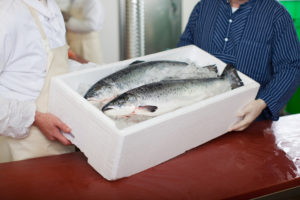Time for a lighter touch

Right in the middle of February, six weeks after the new Brexit rules came into effect, a lorry full of Scottish salmon was stopped at the border control post in the main French fish market of Boulogne-sur-Mer.
The customs officials refused to let the lorry travel the short distance to the market where buyers were waiting. Instead, the haulier was delayed for hours and then told he would have to return across the Channel and take the salmon back to where it came from – Shetland.
The reason for this standoff was the absence of a single line in ink crossing out one box on one page of the multi-sheet export health certificate.
The official signing off the form in Shetland had not crossed out this one box, not because she forgot but because she did not know it had to be crossed out.
Indeed, this particular truck was the eighth to travel to Boulogne-sur-Mer with EHCs completed in this way – without the box being crossed out – and the other seven had been allowed to proceed, unhindered.
The SSPO worked with Seafood Scotland, the hauliers and the French customs to try to get the situation resolved but the standoff continued for hours.
At last, the French officials relented – but only after a guarantee that a new certificate would be emailed over before the lorry could be released and that a hard copy certificate would arrive at the customs post as soon as possible.
The market was shut by the time the lorry was released, leaving the buyers without salmon and the customers frustrated.
Thankfully, this sort of episode is the exception, rather than the rule. Most lorries are getting through relatively speedily but that doesn’t lessen the impact of this sort of problem, when it does occur.
Indeed, this incident highlighted problems which have never been resolved and which need to be sorted out if our producers are ever to get back to the sort of relationship they had with their European customers before Brexit.
There was certainly a “jobsworth” quality to the French approach to this consignment which made it difficult to resolve.
Even in the world of customs, threatening to send a load of fish all the way back to Shetland because one section was not crossed out does seem extreme, particularly as this had never been an issue before.
It is that combination of intransigence and inconsistency that is most worrying.
Inconsistency is understandable: these are new arrangements, the customs officials are overloaded with paperwork and loads to clear. Some will interpret the rules differently from their colleagues.
But, if that is the case, then it would make sense to adopt a light touch approach at the same time, recognising that there will be confusion on both sides and sending the salmon on to market while demanding a follow-up hard copy of the correct certificate would have been the best option.
But adopting both inconsistency and inflexibility just leads to anger, frustration and further problems, on all sides.
The irony is that this is salmon which would have sailed through the border posts untouched and unchecked before January 1. Yet now, because of Brexit, it is being treated with so much suspicion, it is a wonder it gets through at all.
For the first few weeks after January 1 this year, our attention was focused on Scotland, on the hubs that had been set up to process the export health certificates – and rightly so.
This was where the queues were developing, this was where the problems were occurring and this was where our member companies needed help.
But now that the hubs are working more smoothly – and credit should go to both Food Standards Scotland and the hauliers for that – attention has shifted to the trickier issue of French customs.
The ministerial Brexit task force, set up by the UK Government at the request of the SSPO, has started to meet and is designed to come up with practical solutions to the paperwork issues which have caused so many problems.
But, at some point, the focus has to shift across the Channel and that means real, proper engagement with the European Union.
We really do hope that the taskforce achieves its objectives and eases the pressure on those pinch points that have caused so much trouble. However, it can really only do so for the UK.
The next stage has to be to get the agreement of the European Union for the sort of pragmatic approach which would have released that lorry load of Shetland salmon on time to get to the market.
The fear is that the UK Government, having agreed to set up the task force and to sort out the issues our sector has with Brexit, thinks this is now sorted.
It is, after all, the approach politicians like to adopt: set up a working group to look into an issue. Then any criticism can be deflected by saying that it would be inappropriate to say anything until the group has done its work.
That cannot happen this time. Every time one of our producer members faces a situation like the one at Boulogne last month, it is not just the price of the salmon that drops, it is the reputation for reliability that the whole sector has built up over decades.
That is why it is important that the UK Government does not sit back and think – sorted. That is why the SSPO and our member companies will continue to keep the pressure on until we really do see that progress has been made.
That will involve reaching an agreement with the European Union to adopt a lighter touch on customs and we will know when it has really worked.
It will have worked when all of our salmon – every single load – progresses easily and swiftly to market: unhindered, untouched and on time.


